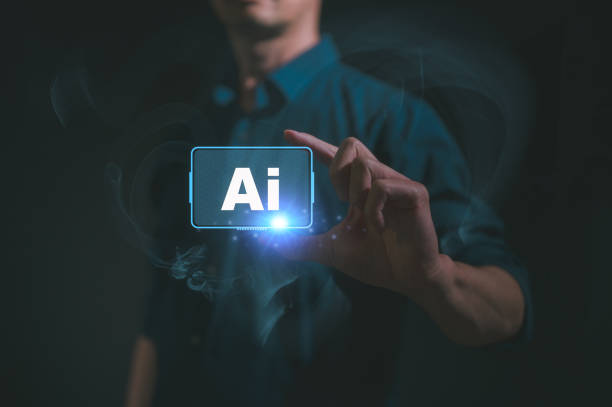What is Artificial Intelligence and How Does It Work

Artificial Intelligence (#AI) is a branch of computer science that aims to create machines that can perform tasks that usually require human intelligence.
These tasks include learning, reasoning, problem-solving, language understanding, and pattern recognition.
Artificial intelligence uses various algorithms and models to perform these tasks.
These algorithms analyze data, identify patterns, and make decisions based on them.
Generally, artificial intelligence uses two main methods for learning: machine learning and deep learning.
In machine learning, algorithms gradually learn by using training data to improve their performance in a specific task.
In deep learning, deep neural networks are used to analyze complex data.
Artificial intelligence has very wide applications.
This technology is used in fields such as medicine, engineering, economics, and art.
For example, in medicine, artificial intelligence can be used to diagnose diseases, develop drugs, and provide personalized healthcare.
Did you know that a weak company website loses you many opportunities daily? Solve this problem forever with professional corporate website design by Rasaweb!
✅ Create a powerful and reliable image of your brand
✅ Attract targeted new customers and increase sales
⚡ [Get a free website design consultation]
Applications of Artificial Intelligence in Everyday Life

Artificial intelligence is no longer a science fiction concept, but an integral part of our daily lives.
From voice assistants like Alexa and Siri to recommendation systems in Netflix and Amazon, artificial intelligence is constantly influencing how we interact with the world.
Language translation systems, self-driving cars, and facial recognition in smartphones are all examples of everyday applications of artificial intelligence.
One of the important applications of artificial intelligence is in the customer service industry.
Chatbots and virtual assistants can answer customer questions, solve problems, and provide the necessary information, while human operators can focus on more complex tasks.
This leads to increased efficiency and improved customer satisfaction.
Artificial intelligence also plays a significant role in smart homes.
Devices such as smart thermostats and lighting systems can automatically adjust by learning your habits and reduce energy consumption.
The Impact of Artificial Intelligence on Various Industries

Artificial intelligence is creating fundamental changes in various industries.
In the manufacturing industry, #AI helps companies optimize their processes, improve product quality, and reduce costs.
Robots equipped with artificial intelligence can perform repetitive and dangerous tasks, while artificial intelligence-based systems can analyze production data and identify hidden patterns.
In the financial industry, artificial intelligence is used for fraud detection, risk management, and providing personalized financial services.
Artificial intelligence algorithms can identify suspicious transactions and prevent financial fraud.
Artificial intelligence can also help investors make more informed decisions and increase their investment returns.
In the healthcare industry, artificial intelligence can be used to diagnose diseases, develop drugs, and provide personalized healthcare.
Artificial intelligence algorithms can analyze medical images and detect signs of disease earlier than doctors.
#AI can also help researchers develop new drugs faster and cheaper.
| Industry | Application of Artificial Intelligence |
|---|---|
| Manufacturing | Process optimization, Robotics |
| Finance | Fraud detection, Risk management |
| Healthcare | Disease diagnosis, Drug development |
Challenges and Limitations of Artificial Intelligence

Despite its vast potential, artificial intelligence also faces challenges and limitations.
One of the most important challenges is bias in algorithms.
If the training data used to train the algorithms is biased, the algorithms will also be biased.
This can lead to unfair and discriminatory decision-making.
Another challenge is the issue of transparency and interpretability of artificial intelligence.
Many artificial intelligence algorithms, especially deep learning algorithms, operate as black boxes.
This means that it is difficult to understand how the algorithm arrived at a particular decision.
This can reduce trust in artificial intelligence and make accountability difficult.
Ethical issues are also another important challenge of artificial intelligence.
For example, the use of artificial intelligence in autonomous weapons can have devastating consequences.
Also, artificial intelligence can lead to job losses, which requires proper planning and policymaking.
Tired of losing business opportunities due to not having a professional corporate website? Don’t worry anymore! With Rasaweb’s corporate website design services:
✅ Your brand’s credibility and professionalism increases.
✅ You attract more customers and sales leads.
⚡ Get a free consultation to get started now!
The Future of Artificial Intelligence and Its Impact on Society

The future of artificial intelligence is very bright and this technology is expected to increasingly penetrate our lives in the coming years.
With recent advances in machine learning and deep learning, artificial intelligence is becoming a more powerful and versatile tool.
Artificial intelligence is predicted to have a profound impact on society and change how we live, work, and interact with each other.
One of the important trends in the future of artificial intelligence is the increasing autonomy of intelligent systems.
Artificial intelligence systems will increasingly be able to make decisions and act without human intervention.
This can lead to increased efficiency and reduced costs, but also raises concerns about control and accountability.
Another trend is the integration of artificial intelligence with other technologies such as the Internet of Things, blockchain, and augmented reality.
This integration can lead to the creation of innovative and powerful solutions for a wide range of problems.
For example, artificial intelligence and the Internet of Things can be used to create smart and efficient cities.
The Role of Humans in the Age of Artificial Intelligence

With the expansion of #ArtificialIntelligence, the role of humans in the workplace and society will undergo changes.
While some jobs will be lost due to automation, new job opportunities will also be created.
To succeed in the age of artificial intelligence, humans must learn new skills and adapt to change.
One of the most important skills in the age of artificial intelligence is critical thinking and problem-solving.
Humans must be able to analyze complex issues, provide creative solutions, and make informed decisions.
Also, communication and collaboration skills will become increasingly important.
Humans must be able to communicate effectively with each other and with machines and collaborate in teams.
In addition to technical skills, soft skills will also become more important in the age of artificial intelligence.
Skills such as empathy, creativity, and emotional intelligence will be essential for success in the workplace.
Humans must be able to empathize with others, offer new ideas, and manage their emotions.
Ethics in Artificial Intelligence: Key Considerations

The development and use of artificial intelligence come with important ethical issues.
Ensuring that #ArtificialIntelligence is used fairly and responsibly is essential.
One of the most important ethical considerations is the issue of #bias in algorithms.
To prevent bias, training data must be diverse and representative.
Also, algorithms must be constantly reviewed and corrected to prevent unfair decision-making.
The issue of privacy is also another important ethical consideration.
Artificial intelligence systems often require a large amount of personal data.
Protecting this data and ensuring that it is used responsibly is essential.
Also, there should be transparency about how data is collected, used, and shared.
Accountability is also another important aspect of ethics in artificial intelligence.
In the event of an error or damage caused by artificial intelligence systems, it must be determined who is responsible.
This can be complex, especially in the case of self-driving systems.
To solve this issue, new laws and regulations need to be created.
| Ethical Considerations | Explanation |
|---|---|
| Bias | Preventing unfair decision-making |
| Privacy | Protecting personal data |
| Accountability | Determining responsibility in case of error |
The Future of Research and Development in Artificial Intelligence

Research and development in artificial intelligence is advancing rapidly.
Researchers are working on new algorithms, new hardware architectures, and new applications for artificial intelligence.
One of the important research areas is the development of artificial general intelligence (AGI).
AGI is a type of artificial intelligence that can perform any task that a human can perform.
Creating AGI is a major challenge, but achieving it could have a profound impact on society.
Another area is the development of explainable artificial intelligence (XAI).
XAI allows artificial intelligence algorithms to explain how they reach their decisions.
This can increase trust in artificial intelligence and make accountability easier.
In addition, research is being conducted in the areas of reinforcement learning, unsupervised learning, and self-supervised learning.
These techniques allow machines to learn by interacting with the environment, without the need for labeled training data.
Are you losing potential customers due to an unprofessional website? Rasaweb is your answer! With our specialized corporate website design services:
✅ Enhance the credibility and position of your business
✅ Experience attracting more targeted customers
⚡ Take action now to get a free consultation!
How to Learn Artificial Intelligence

If you are interested in learning artificial intelligence, many resources are available to you.
You can increase your knowledge in this field by taking online courses, reading books and articles, and participating in practical projects.
Many online courses are available on websites such as Coursera, EdX, and Udemy.
These courses can teach you the basics of artificial intelligence and help you acquire the skills necessary to work in this field.
In addition to online courses, many books and articles are also available on artificial intelligence.
You can read introductory books to learn the basics of artificial intelligence and then move on to more advanced books.
Also, scientific articles can inform you of the latest advances in this field.
One of the best ways to learn artificial intelligence is to participate in practical projects.
By working on practical projects, you can apply your knowledge and develop your skills.
You can participate in open-source projects, participate in artificial intelligence competitions, or create your own personal projects.
Conclusion and Final Perspective on Artificial Intelligence

Artificial intelligence is a powerful and transformative technology that is changing the world.
This technology has vast potential to solve complex problems, improve the quality of life, and create new opportunities.
However, artificial intelligence also faces challenges and limitations that must be taken seriously.
To exploit the potential of artificial intelligence and prevent its negative consequences, cooperation is needed between governments, industry, and civil society.
The future of artificial intelligence is very bright and this technology is expected to increasingly penetrate our lives in the coming years.
With recent advances in machine learning and deep learning, artificial intelligence is becoming a more powerful and versatile tool.
#ArtificialIntelligence is predicted to have a profound impact on society and change how we live, work, and interact with each other.
Ultimately, artificial intelligence should be used as a tool to serve humanity.
By developing and using this technology responsibly, we can create a better and more just world for all.
The key to success in the future of artificial intelligence is to strike a balance between innovation, ethics, and accountability.
Learning artificial intelligence is necessary to enter today’s modern world.
Frequently Asked Questions
| Question | Answer |
|---|---|
| What is artificial intelligence? | It is the simulation of human intelligence in machines programmed to think like humans and mimic their actions. |
| What are the main branches of artificial intelligence? | They include machine learning, deep learning, natural language processing, computer vision, and robotics. |
| What is Machine Learning? | It is a branch of artificial intelligence that focuses on enabling systems to learn from data and identify patterns without explicit programming. |
| Mention examples of artificial intelligence applications in our daily lives. | Voice assistants (such as Siri and Alexa), recommendation systems in Netflix and Amazon, self-driving cars, and facial recognition software. |
| What is Deep Learning? | It is a subset of machine learning that uses multi-layered (deep) artificial neural networks to process large amounts of data. |
| What is Natural Language Processing (NLP)? | It is a branch of artificial intelligence that focuses on enabling computers to understand, interpret, and generate human language. |
| What are some of the ethical concerns related to artificial intelligence? | They include bias in data, privacy, job losses, and liability in case of errors. |
| What are the main benefits of artificial intelligence? | Increased efficiency, improved decision-making, automation of repetitive tasks, and discovery of complex patterns in data. |
| How is artificial intelligence used in the healthcare field? | In diagnosing diseases, discovering drugs, analyzing medical images, and personalized care for patients. |
| How do you see the future of artificial intelligence? | It is expected to continue to develop at a rapid pace, affecting all aspects of human life, from industry to education and entertainment. |
And other advertising agency services Rasa Web in the field of advertising
Smart Brand Identity: An effective tool for user interaction through precise audience targeting.
Smart UI/UX: A new service to increase online growth through marketing automation.
Smart Google Ads: An effective tool for attracting customers through Google Ads management.
Smart Advertising Campaign: A new service to increase website visits by optimizing key pages.
Smart Social Media: A professional solution for analyzing customer behavior with a focus on intelligent data analysis.
And more than hundreds of other services in the field of internet advertising, advertising consulting, and organizational solutions
Internet Advertising | Advertising Strategy | Advertorial
Sources
Gartner Analytical Artificial Intelligence
,IBM Artificial Intelligence
,Oracle Artificial Intelligence
,Artificial Intelligence in Microsoft Azure
? Are you looking to take your business to the top in the digital world? Rasaweb Digital Marketing Agency helps you shine online and achieve your goals by providing comprehensive SEO-optimized website design services. With us, experience a powerful and memorable presence.
📍 Tehran, Mirdamad Street, next to the Central Bank, South Kazerun Alley, Ramin Alley No. 6




